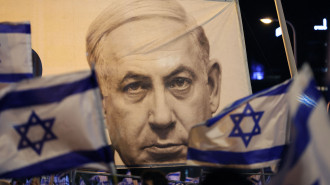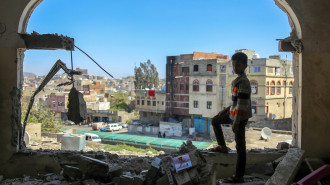
Bordering on insecurity: What's at stake in Lebanon-Israel border negotiations?

Last Wednesday, Lebanese and Israeli forces shot tear gas and smoke bombs at one another for the second time in one week.
The Lebanese army was removing what it called an illegal Israeli "infringement" of the Blue Line - the UN line created to confirm Israeli forces' withdrawal from south Lebanon in 2000 - when it came under Israeli smoke grenades.
Just a few weeks before Israeli and Lebanese troops clashed in the south, US mediator Amos Hoschstein touched down in Beirut, meeting with top Lebanese leadership.
His visit was aimed at reducing tensions along Lebanon's southern border, by finally defining where exactly that border lies.
"Tensions along the Lebanese-Israel border are at an all-time high, with both sides upping the ante with a series of provocative manoeuvres"
Since Israel withdrew from Lebanon after its 28-year-long occupation of the south of the country, there has been no fixed land border between the two neighbours.
Notable points of contention include the Shebaa Farms, the village of Ghajar, and the Kfar Chouba Hills, which Lebanon claims Israel is occupying illegally.
Lebanon has signalled its willingness to negotiate, with Lebanese Foreign Minister Abdallah Bou Habib saying that land demarcation could put an end to tensions in the south.
Hochstein pledged to draw up a "feasibility study" for land demarcation and talk to Israel next to determine its negotiation position.
Analysts have said that tensions along the Lebanese-Israel border are at an all-time high, with both sides upping the ante with a series of provocative manoeuvres.
Pro-Iran militia Hezbollah had set up two 'military tents' in what it views as occupied Lebanese territory, as well as allegedly infiltrated and set up a roadside bomb in northern Israel. The group has not claimed responsibility for the bomb, which went off without causing any casualties.
Israel has unilaterally walled off Ghajar, a town of Alawite Arabs that the UN split between Lebanon and Israel after 2000, as well as promised to send "Lebanon back to the stone age" if provoked.
Demarcating the land border could reduce tensions in Lebanon's south, particularly between Israel and Hezbollah.
However, a deal also threatens to strike at the core of Hezbollah's legitimacy and the Lebanese state's ability to exercise its monopoly of force within its own borders.
|
|
Hezbollah was founded as a resistance militia to the Israeli occupation of southern Lebanon. Despite Israel's withdrawal in 2000, the group has kept the same credo, claiming it is the main deterrence force against another Israeli occupation.
Reclaiming the Shebaa farms and other territory occupied by Israel is a constant refrain by Hezbollah head Hassan Nasrallah. And, despite nominally committing to disarming under UN resolution 1559, which called for the disbanding of Lebanese militias in 2004, Hezbollah has said it needs to continue operating until any Israeli threats are quelled.
"For Israel and the US, this is a way to pull the carpet out from Hezbollah's feet. Its whole rationale is built on the fact that they're a resistance force and they're still here to liberate Israeli-occupied land," Karim el-Mufti, a political science scholar at Sciences Po, told The New Arab.
According to el-Mufti, settling the land border would significantly hurt the group's claim that it has retained its weaponry in its capacity as a resistance force to Israel's occupation of Lebanese land.
"For Israel and the US, this is a way to pull the carpet out from Hezbollah's feet. Its whole rationale is built on the fact that they're a resistance force and they're still here to liberate Israeli-occupied land"
However, if the Israeli occupation of Lebanese areas like the Shebaa Farms ended, theoretically there would be no more territory for Hezbollah to liberate.
As a result, Hezbollah's domestic opponents who see the group not as a resistance force but as a non-state militia that challenges the Lebanese state's sovereignty would see their arguments strengthened.
Still, despite it potentially being contrary to the militia's interests, Hezbollah officials have told Lebanese media that they are willing to engage in negotiations.
According to analysts, the process of negotiations is in Hezbollah's strategic interests, even if the results would not be.
"Hezbollah understands that this is reassuring for Israel, because Israel has been giving serious concerns about Hezbollah's escalations … and neither Hezbollah nor Israel wants war," Hanin Ghaddar, the Friedmann Fellow at the Washington Institute, told TNA.
Taking part in negotiations does necessitate a compromise, and Hezbollah is fully willing to put forward a maximal form of demands, which it is betting Israel is unlikely to agree on.
If the Israelis turn down Hezbollah's demands, it would be a rhetorical victory for the group and proof that it is indeed the defender of Lebanese sovereignty, both with weapons and through negotiations.
"The main Hezbollah argument is thanks to our strength we can get concessions from Israel. If we weren't here, they would take everything like they did with Palestine today. That's very hard for the Lebanese Armed Forces and Lebanese state to shove aside," el-Mufti said.
|
|
Hezbollah is not the only stakeholder in Lebanese-Israeli land border negotiations. The Lebanese state, Israel, and the US as a mediator all have their own considerations.
Israel and the US's primary concern is de-escalating the current situation in the south and ending the perennial cycle of flare-ups between Lebanon and Israel.
Both parties also view Lebanon as being in a weak bargaining position, due to its four-year-long economic crisis and state of complete political deadlock. A more emboldened Lebanon could be harder to bring to the negotiating table or extract concessions.
The Lebanese state, particularly, the political class, have dual incentives to engage in negotiations, as the US is likely to use both the carrot and stick to get Beirut to negotiate.
"Israel and the US's primary concern is de-escalating the current situation in the south and ending the perennial cycle of flare-ups between Lebanon and Israel"
"At this point it's not about the border demarcation anymore, it's about buying time. There's a lot of pressure on Lebanon, so from time to time they like to engage the international community, with Hezbollah's blessing," Ghaddar said.
The five-nation group on Lebanon - which includes the US, France, Qatar, Saudi Arabia, and Egypt - have hinted that sanctions are on the table against Lebanese leaders who are obstructing reforms.
Engaging in negotiations and showing that the Lebanese state takes the international community's security concerns seriously could help relieve some pressure on Lebanon.
The US could also offer some incentives to Lebanon for reaching a land demarcation deal, specifically through increased security assistance.
Lebanon's army is currently propped up by the international community, with its soldiers' salaries paid by the US and their meals supplied by Qatar.
The security situation is tenuous, with armed clashes breaking out sporadically between factions, such as when a Hezbollah truck carrying munitions overturned and two were killed in the resulting fighting on 9 August.
Still, while bolstered security assistance could grease the wheels of future negotiations, it will likely be slow going.
It took over a decade of negotiations for Lebanon and Israel to agree on a maritime border between the two countries, and the maritime negotiations carried billions of dollars of incentives, as they were a pre-requisite to accessing offshore hydrocarbon reserves.
"Technically speaking, the dossier is so complicated, it will take years to negotiate. It's massive," el-Mufti said.
William Christou is The New Arab's Levantine correspondent, covering the politics of the Levant and the Mediterranean.
Follow him on Twitter: @will_christou




